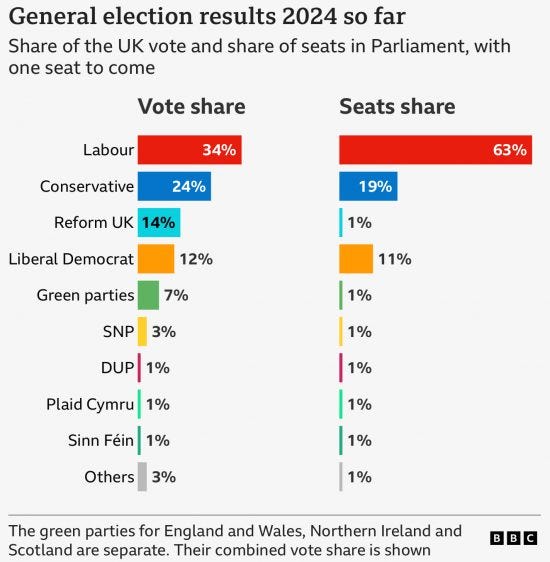
Yet again the issue of first-past-the-post (FPTP) voting comes to the fore. In my constituency the support for the Labour Party is traditionally overwhelming and so my vote has no effect.
Advocates for proportional representation (PR) are told it’s a bad idea because it likely results in no party getting an overall majority. Yet the latter stages of the 2024 General Election has seen desperate attempts to minimise Labour’s margin of victory for fear of radical constitutional change planned by Starmer and Brown.
Another argument for the status quo is that it preserves the personal link between an MP and his/her constituents. Yet modern voting seems to be about parties and party leaders, almost like a US Presidential election. Great MPs like the late Frank Field have lost out when they have tried to stand as independents because of some issue of principle.
Meanwhile we see a House of Lords in a scrappy state after New Labour’s tinkering - and it’s still (in some cases) a place to put people who’ve been generous donors or reliable party stooges.
In a wild moment Tony Benn called for creating a thousand new peers and then abolishing the peerage. If this implied doing away with a second chamber altogether it could have meant disaster: imagine a dominant political party that could enact laws fast and without revision.
So why not have the best of both - FPTP and PR?
Keep the constituency system as it is, with its flaws but also with the connection to an individual representative. Replace the House of Lords with a Senate of 100 - which is sufficient for the USA, a nation five times larger - whose seats are filled according to party affiliation?
The electorate would have two votes, as they do already in Scotland and Wales. One would be for their local candidate for the Commons, the other would be for the party whose philosophy they found most attractive. Look at the 2024 results above and see under ‘vote share’ for how this year’s Upper House could be constituted. Labour, seemingly almighty in the Commons, would have to get its legislation through the revising chamber with the support of some other parties - which might not be taken for granted on particular issues. Even now a Conservative/Reform bloc representing 38% of the total would be a formidable opposition to Labour’s 34%.
Would this be a better balancing system?
4 comments:
Seats, a much reduced number, in the House of Lords should be filled by those judged suitable for jury service and selected in the same random fashion.
Maybe serve a short term six months, a year, and then he excused for a few years.
They would not be self selective, the usual politician drawback. They would have a combined wide experience of real life.
Their appointment being sudden, the lobbyists will not have had a chance to pre-nobble them and their short time of service will also mean that they are a poor long term investment for the lobby men.
Having served their time each former Lord/Dame will have acquired a true insight into the murky goings on of Government. Thus there will be a resulting growing pool of people in society with a lively cynical attitude to our political system.
Tell me where I am wrong.
And the US system is so 'balanced' that a tiny minority is preventing anything getting done. We are turning into the French.
In the US, the Senate system was a compromise to protect the states with less population, and ultimately slavery.
Senate seats are filled by a separate vote, as you suggest, with at least two parties fielding candidates. The Senate has a couple of independents.
Post a Comment